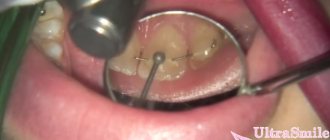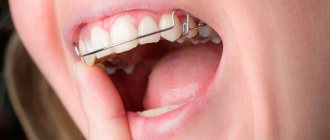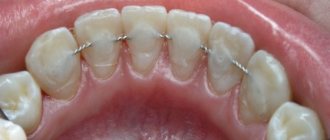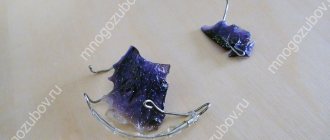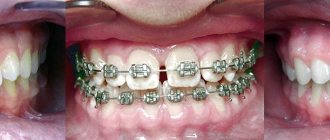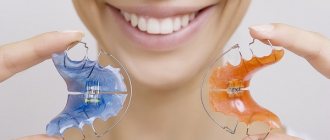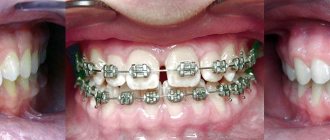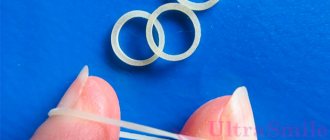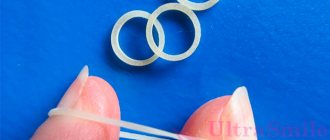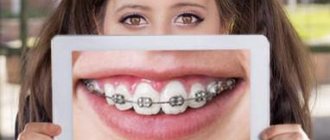Correcting a bite is a complex and lengthy process that requires a lot of patience. But not everyone knows that treatment does not end with wearing braces. The fact is that the design of brace systems requires a fairly quick correction of the patient’s tooth position, but it cannot guarantee the stability of the result. This is due to the structure of the jaw and other natural factors. To consolidate progress After braces a retainer is installed and leave it for the required period.
About retention, the mechanisms of its occurrence and consequences, read the article: What are impacted teeth, why do they appear and how to treat them...
When is it time to remove braces?
Typically, the duration of wearing braces depends on the severity of the pathology and the age of the patient. The more complex the clinical case and the older the person, the longer it takes to straighten the teeth. However, the first changes are noticeable within a few months after fixing the system. When it is clear that it is time to remove the braces, the doctor will inform you about the expected end date of treatment.
The process of correcting the bite can take from several months to 2 years. An experienced and highly qualified orthodontist is able to select the most optimal correction scheme that allows you to achieve your goal in the shortest possible time. If you strictly follow all the instructions, the day when you need to remove your braces will not be long in coming.
Duration of correction
According to statistics collected through research, the duration of treatment with braces in adults varies widely - from six months to two years. In the case of patients in the younger age group, the average period is one year, but is also determined by the severity of the diagnosed pathology. In addition, factors that determine timing include:
- Condition of the oral cavity – in the absence of associated inflammation and diseases, treatment proceeds faster and eliminates deviation from the desired result;
- Type of braces - today there are various models that differ in both configuration and location, as well as the materials used in manufacturing;
- Quality of hygienic care - compliance with medical recommendations allows you to avoid the development of pathological processes and prevent damage to the structure;
- Positioning accuracy – when installing braces, parameters in three planes are taken into account, which requires the use of hardware diagnostic methods.
The final result is also influenced by the qualifications of the orthodontist, whose responsibilities include not only calculating the parameters for making braces, but also subsequent setup, adjustment and periodic activation of the system.
How are braces removed from teeth?
Most patients know virtually nothing about how braces are removed. The procedure is simple and involves several manipulations. Before the doctor begins work, you can ask him how long it takes to remove braces. As a rule, regular clasps are removed in about twenty minutes, and a lingual system in just under an hour. Any orthodontist can remove braces, regardless of whether the person is his patient or not.
The process of removing braces involves several stages.
- Preparation.
A retractor is installed for the patient to protect the oral mucosa from damage. - Removal of the structure.
The ligatures and arches are removed first, then the braces themselves. - Grinding.
Remains of glue are removed from the teeth by polishing, and the enamel is coated with a remineralizing composition.
Does it hurt to remove braces? Definitely not. Dental procedures cause some discomfort, but the discomfort is quite minor and mainly depends on the individual pain threshold.
Advantages of composites
Modern compounds used for dental restoration are distinguished by high strength, durability, and the ability to choose any shade. In this regard, many patients often go too far, wanting to have unnaturally snow-white units. The focus on media characters is commendable, but it is worth remembering that such elements require careful care, which requires time and money. Our clinic’s specialists are inclined towards the option of restoring teeth using natural-colored composites. Indications for the use of such compositions include many factors. Among them are caries in the spot stage, extensive lesions, pigmentation, and unusability of old fillings. The only disadvantage noted by experts is the gradual “eating” of the layer. Over 10–12 years, the material shrinks, as a result of which a repeat procedure is necessary. But the benefits of dental restoration using composites are much greater.
- There is no need for deep grinding of the elements to the stump, which prolongs the life of the units and relieves the patient of discomfort.
- The materials used are completely safe, have no contraindications and are perfectly integrated into the oral cavity.
- The high strength of gel-like compositions virtually eliminates the possibility of scratches on the applied surface.
- The latest generation polymers used to prepare composite compositions are able to withstand critical temperatures.
- The ability to restore the aesthetic and functional role of the anterior and lateral units in one visit to the doctor attracts clients.
IMPORTANT! When restoring teeth using composite compounds, the doctor always has the opportunity to adjust the result. If there is a shortage of material, an additional layer is applied, and if there is an excess, the excess is ground off. The financial aspect is also a significant advantage. The procedure for restoring functionality in one visit to the dentist saves not only time, but also money for the client.
Can I remove braces myself?
The query “How to remove braces at home?”
found on the Internet quite often. But it should be noted that without special skills and tools it is impossible to correctly remove the system. Removing the structure yourself can cause damage to the mucous membrane, teeth and gums. Even if you have theoretical knowledge of how to remove braces yourself, you should not do this, since the procedure is followed by the mandatory installation of a retainer, which you cannot purchase and secure yourself. In addition, at home it is also impossible to remove glue residues and polish the surface of the teeth.
Even one loose bracket cannot be removed without the help of a doctor without damaging the entire structure. It is necessary to make an appointment with an orthodontist as soon as possible to repair the system, since the absence of one element can disrupt its balance, and the effectiveness of treatment will decrease. Before going to a specialist, it is better to fix the fallen lock with medical wax, sold in a pharmacy.
Advantages and disadvantages of caps
The use of mouthguards is characterized by the following advantages:
- There are no difficulties in cleaning your teeth. The structure is removable, so a person can carry out standard hygiene measures without any restrictions.
- There are no dietary restrictions to follow. During the retention period, you are allowed to eat hard and sticky foods.
- Silicone elements do not break , which means there are no problems with their repair.
Among the disadvantages of these systems, orthodontists name:
- Lack of control over the patient's actions. A person may be irresponsible about the need to wear a structure and often take it off.
- Risk of forgetting to put on a mouthguard. This probability is especially high if it is used only at night.
Teeth after removing braces
Usually, after removing braces, the condition of the teeth leaves much to be desired - glue residues, stains and cracks spoil the impression of the treatment result. White areas on the enamel after removing braces indicate a lack of microelements in the tooth tissues during the period of wearing the orthodontic apparatus.
There is no need to worry about aesthetic defects caused by wearing the system. After the braces are removed, the enamel is restored by applying a remineralizing composition, and irregularities are removed by polishing. In some cases, the installation of veneers is used or the method of artistic restoration is used in order to obtain ideal teeth from an aesthetic point of view.
Installation of retainers (retention devices)
Retainer
– a special retaining structure – a wire splint, which is installed on the inner surface of the front teeth and allows them to stabilize their position.
The treating dentist prescribes the required period of wearing retainers depending on various factors:
- The result of treatment;
- Initial severity and type of malocclusion;
- Presence/absence of bad habits;
- Dental health status;
- Patient's age;
- Genetics.
What do you do after removing braces?
The treatment process does not end with getting rid of the orthodontic structure. The doctor will perform several procedures to restore your teeth to their natural color and attractive appearance.
With the help of professional hygienic cleaning after removing braces, the remaining glue, plaque and tartar that have accumulated under the clasps while wearing the device are removed from the tooth surface. Remineralizing therapy and fluoridation saturate the enamel weakened by constant stress with the necessary substances.
After removing braces, teeth whitening is recommended no earlier than a month later, when the condition of the dental tissues improves. Premature lightening threatens increased sensitivity and prolonged pain.
Key recovery goals
Patients sometimes themselves do not understand very well what they want from dental restoration. If, in the event of damage or injury, there is a visible chip or crack, then the reason for the appeal is clear. The doctor must restore the unit to its previous shape with maximum color matching with other elements. If you want to create a Hollywood smile, even with a healthy dentition, treatment is often not required; then microprosthetics using veneers or lumineers is used. Recently, more and more people are asking for hygiene procedures, in particular, whitening, which can also be considered as one of the methods of dental restoration. Modification of functional capacity is most often applied to the lateral units that experience the highest loads. Correction of appearance is especially important in the smile area; it is not without reason that not only public figures, but also ordinary people are increasingly seeking restoration of their front teeth. Thus, the main goals of the procedure are:
- improvement of chewing functions, which contributes to more thorough grinding of food and normalization of the gastrointestinal tract;
- elimination of interdental gaps by changing the position of the elements of the upper and lower dentition;
- treatment of caries in the spot stage, as well as superficial, medium and deep caries with composite materials;
- restoration of lost units or local fragments using plates or gel-like compositions;
- creating a charming “Hollywood smile” using modern technologies.
REMEMBER! Healthy gums and a beautiful smile are a gift that, unfortunately, not everyone has. But there is no need to despair. If 30 years ago artistic and functional restoration of teeth required a lot of money, now anyone can improve their appearance without extra material costs.
What do you wear after braces are removed?
Without the pressure of the orthodontic system, the teeth will try to return to their original position if not prevented. To prevent the teeth from becoming crooked after the braces are removed, the patient is fitted with a special retainer that fixes the dental units in the desired position to secure the result. Such structures are divided into removable and non-removable.
- Fixed retainer.
A thin wire is glued to the inside of the teeth using a filling material. The arch is absolutely invisible when worn, does not affect diction and does not cause discomfort. - Removable retainer.
We are talking about a silicone mouthguard, which is made according to individual impressions of the patient’s jaws, or retention plates after removing braces, intended for use while sleeping.
The retention period exceeds the duration of treatment by at least 2 times. Some patients wear a retainer throughout their life.
Conclusions. Expert advice
The retention period is a very important part of correcting dental pathologies. If the patient behaves incorrectly at this time, the effect may well come to naught. The problem can be prevented using special removable or non-removable devices. They are called retainers.
Main features of orthodontic appliances:
- Requires regular wear for several years.
- They can be removed or attached to the teeth for life - it depends on the patient and the characteristics of his body.
- They require special attention to oral hygiene, the use of an irrigator and brushes.
- They must be worn under the supervision of a specialist.
Doctors know that it is the dental retainer that keeps the bite in the correct state until the muscles get used to the new position of the molars, incisors and canines. It is mandatory to wear the device. If problems arise with any type of orthodontic design, you can always choose another option that will better suit the patient.
Feelings after removing braces
Few people like the way their teeth look after braces are removed. However, aesthetic defects can be easily eliminated. A more serious problem is physical discomfort. After removing braces, teeth hurt from trying to return to their previous position, especially after installing a retainer, which blocks any movement. In addition, weakened and sensitive enamel reacts sharply to temperature changes, which also causes discomfort. Dizziness or nausea after having braces removed may be related to retainers. If such symptoms occur, be sure to consult a specialist.
Video about how to remove braces from teeth
How to care for retainers
Without braces , oral care, of course, is not canceled, but it is still significantly simplified. Patients with fixed retainers must adhere to the usual rules for caring for teeth and orthodontic structures.
Caring for removable retainer mouth guards is as simple as possible, the main thing is not to damage the integrity of their design. The plate must be washed daily in running water and cleaned using a soft toothbrush. To prevent the mouth guard from accumulating plaque, it should be disinfected weekly by placing it in a special solution for a while. Removable retainers can be removed for meals.
It is also necessary to observe the temperature regime: from exposure to high temperatures, a silicone plate made to the shape of the teeth can become deformed and stop performing its task. Removable retainers are stored in a special dental case, which has compact dimensions and is equipped with special holes.
Is it possible to remove braces early?
Sometimes braces are removed faster than planned. This is due to the anatomical features of the jaw structure and accelerated biological processes in the human body. However, such cases are extremely rare.
As a rule, the question “Is it possible to remove braces ahead of time?” doctors answer negatively. The patient must put up with certain inconveniences and undergo full treatment. Otherwise, the teeth will return to their previous position, and time and money will be wasted. In addition, removing the brace system ahead of schedule can lead to disruption of the temporomandibular joint.
Previously, braces could only be removed under certain circumstances.
- Correcting the bite does not bring results, and surgical intervention is required.
- There is an urgent need to replace one system with another for some reason - for example, a breakdown or an allergy to the material.
- The doctor is unable to cope with the anomaly and is forced to redirect the client to another orthodontist.
Is it possible to remove braces temporarily if important public events are coming up? Theoretically this is acceptable, but from a practical point of view it is inappropriate. Firstly, after removal the structure becomes unsuitable for secondary use. You will have to purchase a new system and spend money on its installation. Secondly, after repeated fixation, the time required to correct the bite increases.
Future newlyweds are interested in the question of whether it is possible to remove braces for the wedding. You should take care of the problem in advance and opt for ceramic or sapphire devices or transparent silicone aligners. Then the design will not spoil the festive image.
Factors and consequences of early withdrawal
The treatment method excludes premature dismantling of the corrective structure - with the exception of urgent cases, such as:
- Manifestation of an allergic reaction to elements of braces;
- Lack of positive dynamics;
- Deformation or breakdown of the structure;
- Changing the treatment plan due to its unreasonableness.
Many patients turn to dentists with a request to temporarily remove braces - for example, before an important event. This option is theoretically possible, but the negative effect, as a rule, becomes the main reason for refusal of such a service. It must be taken into account that a used brace system cannot be reinstalled - a new device will need to be manufactured, with associated time and financial costs. In addition, the recovery period increases significantly, since in the interval between removal and installation, the teeth can return to their original position.
Where to remove braces in Moscow and how much does it cost?
The removal of the system is carried out by the attending physician in the same clinic where it was installed, so the patient does not have to look for a dentist to carry out the procedure.
With turnkey treatment, there is no need to find out in the capital's centers how much it costs to remove braces, since the service is already included in the final price. In addition, the amount includes the costs of the device itself and its installation. If all stages of bite correction are paid separately, then the cost of removing the device is about 10,000 rubles.
After wearing braces, you will need to put in a lot of effort to maintain a beautiful smile. However, those who have patiently gone through the entire path of bite correction from braces to a retainer confirm that the end result justifies any difficulties of the process!
Is it possible to change the situation?
1. If desired, bringing your smile to perfection will not be difficult and will not always require significant investments. After all, the first, most important, most necessary stage has already been completed. Orthodontic treatment corrects your bite, straightens your teeth, and prevents more serious dental problems. And modern methods of artistic (or aesthetic) dental restoration will help restore the aesthetics of the dentition.
2. Adults are able to solve the dilemma themselves: whether to continue treatment if they don’t quite like the smile, or limit themselves to the achieved result.
Features of teeth extensions
One of the most popular types of dental restoration is tooth augmentation. This direct method is used for minor damage, for example in the case of superficial or intermediate caries. It is important that the area of damage is no more than 25–30%. Dental restoration by extension can mean both partial restoration of a local fragment and complete correction of shape and color. The use of filling material is not always possible, so the most common option is to build it onto a pin, around which a composite composition is applied. This method of dental restoration is often used for children who cannot receive veneers and lumineers. Traditional options using inlays make it possible to preserve the nerve and pulp. Each method of dental restoration using extensions has its advantages.
- Extension with filling has excellent aesthetic characteristics: the new element does not differ from its neighbors. The appearance can always be adjusted. As one of the direct methods of dental restoration, extensions are carried out during one session, which saves effort, time and money. Along with masking visual imperfections (stains, cracks, chips), the procedure strengthens the elements and promotes the healing of soft gum tissue.
- Pin extensions are most often used in cases of severe damage. There are different options, shapes and materials for the base of a future crown, which allows you to approach the problem individually in each case. After an X-ray examination, 3D modeling is carried out, which allows doctors to assess the reliability of the future design, and the patient to assess the external attractiveness of the new element. After this, the rod is implanted into the root and a filling compound is applied.
ATTENTION!
The price of tooth restoration using extensions depends on many factors: the use of anesthesia, the materials used, the amount of work. In any case, this is one of the most reliable and practical methods of restoring the aesthetic and chewing functions of the dentition. Much depends on the doctor’s experience and the availability of modern equipment. The presence of knowledgeable specialists, the latest generation technology, safe anesthetics, and sterile instruments in any of the branches of the VivaDent allows us to successfully solve the most complex problems.
Dental prosthetics with ceramic crowns and veneers
When the preparatory stages were completed (teeth cured, muscle balance normalized), the wire retainers were removed for 3 months to allow the teeth to stand naturally. The shape of the ceramic restorations will depend on the position of the teeth.
After 3 months, a digital scan of the teeth was performed and digital impressions were obtained. For the patient, digital impressions are very convenient, since there is no unpleasant impression mass in the mouth, which causes a gag reflex in many people.
Digital impressions are also convenient for the doctor, as they allow them to model restorations on a computer and transfer the modeling results to the laboratory.
Before being sent to the laboratory, the simulated dental restorations are transferred into the patient’s oral cavity using a special quick-hardening plastic. That is, the shape of the restorations is transferred to the teeth without grinding, and the patient can make adjustments to the length, shape, etc. After the design is approved, the crowns are made in Dial-Dent’s own laboratory using computerized equipment that grinds crowns from ceramic blanks with high precision.
After grinding, the dental technician paints the restorations and covers them with a layer of ceramic to give them a shine like natural enamel. Such restorations are very similar to natural teeth, only without natural imperfections.
Ceramic crowns and veneers are made from E.max ceramics, which are highly durable and have excellent aesthetics.
The crown on the implant was replaced, and additional parts had to be ordered individually, since the patient had an Ankylos system implant installed (Dial-Dent installs the most reliable Astra Tech implants, and each implant system requires its own tools, transition parts, etc.). All the parts needed to replace the crown were given to the patient, as they may be useful in the future if the need for re-prosthetics arises.
